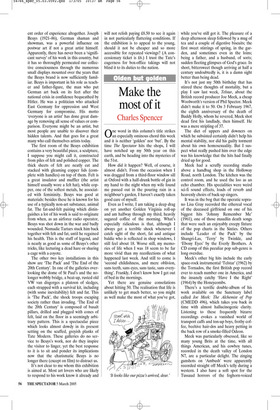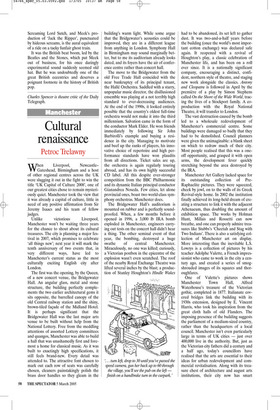Make the most of it
Charles Spencer
One word in this column’s title strikes an especially ominous chord this week and it is neither ‘golden’ nor ‘but’. By the time The Spectator hits the shops, I will have notched up my 50th year on this earth, and be heading into the mysteries of the 51st.
How did it happen? Well, of course, it almost didn’t. From the occasion when I was dragged from a third-floor window sill at Oxford with a half-drunk bottle of gin in my hand to the night when my wife found me passed out in the pouring rain in a neighbour’s garden, I haven’t exactly taken good care of myself.
Even as I write, I am taking a deep drag on yet another Golden Virginia roll-up and am halfway through my third, heavily sugared coffee of the morning. What’s especially ridiculous is that, although I always get a terrible shock whenever I catch sight of the short, fat and antique baldie who is reflected in shop windows, I still feel about 18. Worse still, my memories of life when I was 18 seem to be far more vivid than my recollections of what happened last week. And still to come is ‘second childishness, and mere oblivion, sans teeth, sans eyes, sans taste, sans everything’. Frankly, I don’t know how I get out of bed in the mornings.
Yet there are genuine consolations about hitting 50. The realisation that life is unlikely to get much better, so you might as well make the most of what you’ve got, while you’ve still got it. The pleasure of a deep afternoon sleep followed by a mug of tea and a couple of digestive biscuits; the first sweet stirrings of spring, in the garden, and sometimes even in the loins; being a father, and a husband, of sorts; sudden fleeting glimpses of God’s grace. In short, bittersweet though arriving at half a century undoubtedly is, it is a damn sight better than being dead.
It’s not just my 50th birthday that has stirred these thoughts of mortality, but a play I saw last week, Telstar, about the British record producer Joe Meek, a cheap Woolworth’s version of Phil Spector. Meek didn’t make it to 50. On 3 February 1967, the eighth anniversary of the death of Buddy Holly, whom he revered, Meek shot dead first his landlady, then himself. He was a mere stripling of 37.
The diet of uppers and downers on which he subsisted certainly didn’t help his mental stability, nor did his guilty torment about his own homosexuality. But I suspect what really pushed him over the edge was his knowledge that the hits had finally dried up for good.
Meek had a scruffy recording studio above a handbag shop in the Holloway Road, north London. The kitchen was the control room, and he used the loo as an echo chamber. His specialities were weird sci-fi sound effects, loads of reverb and heavenly choirs of back-up singers.
It was in the bog that the operatic soprano Lisa Gray recorded the ethereal vocal of the deceased girlfriend on one of his biggest hits ‘Johnny Remember Me’ (1961), one of those maudlin death songs that were such an enjoyably creepy fixture of the pop charts in the Sixties. Others include ‘Leader of the Pack’ by the Shangri-Las, ‘Terry’ by Twinkle, and ‘Ebony Eyes’ by the Everly Brothers. A CD comp of this peculiar pop sub-genre is long overdue.
Meek’s other big hits include the early space-rock instrumental ‘Telstar’ (1962) by the Tornados, the first British pop record ever to reach number one in America, and the insanely catchy ‘Have I the Right’ (1964) by the Honeycombs.
There’s a terrific double-album of his work available on the Sanctuary label called Joe Meek: The Alchemist of Pop (CMEDD 496), which takes you back in time with almost hallucinogenic clarity. Listening to these frequently bizarre recordings evokes a vanished world of transport caffs and ton-up boys, frothy coffee, beehive hair-dos and heavy petting in the back row of a smoke-filled Odeon.
Meek was particularly obsessed, like so many young Brits at the time, with all things American, and his cowboy tunes, recorded in the death valley of London N7, are a particular delight. The zinging gunshots on ‘Ambush’ were apparently recorded straight off Meek’s telly during a western. I also have a soft spot for the Tussaud horrors of the foghorn-voiced Screaming Lord Sutch, and Meek’s production of ‘Jack the Ripper’, punctuated by hideous screams, is the aural equivalent of a ride on a tacky funfair ghost train.
It was the British beat boom, led by the Beatles and the Stones, which put Meek out of business, for his once daringly experimental sound suddenly seemed old hat. But he was undoubtedly one of the great British eccentrics and deserves a poignant footnote in the history of British pop.
Charles Spencer is theatre critic of the Daily Telegraph.



























































 Previous page
Previous page